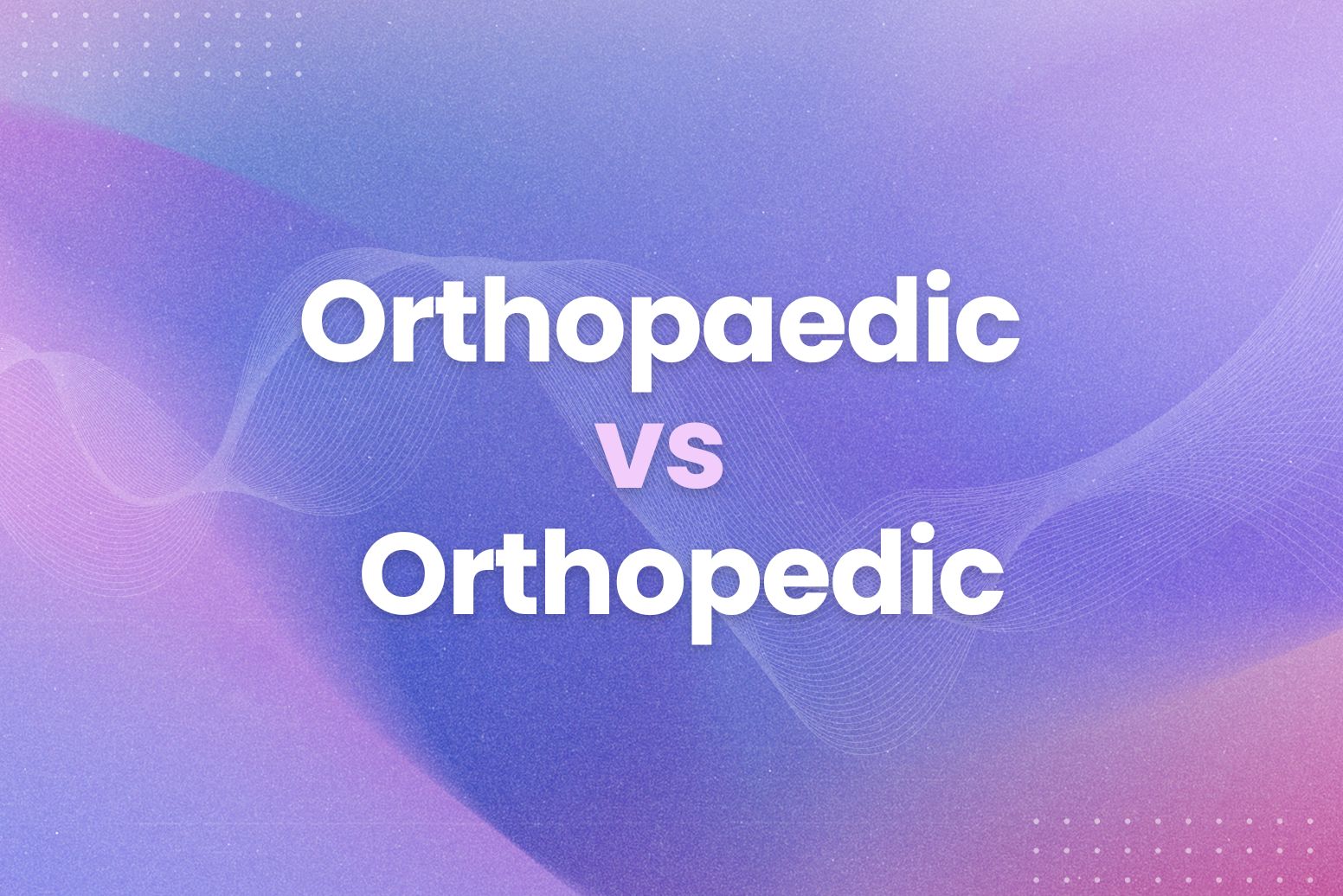The words orthopaedic and orthopedic are quite similar. They have identical meanings and spellings. Therefore, this similarity creates a lot of confusion. A branch of medicine covers both of these terms. This branch deals with the musculoskeletal system. While these terms appear similar, they have slightly different uses. So, in this article, we will minimize the confusion between Orthopaedic vs. Orthopedic. In addition, it will also provide guidelines for proper use.
The Definitions and Their Backgrounds
Understanding their definitions and sources is important to solve the mystery between Orthopaedic vs. Orthopedic. Orthopaedic is the original spelling of the Greek words orthos and paidion. Orthos means straight, while paidion means child.
It was the original specialty of the practice, as it was used to correct skeletal defects in children. The term was first used in 1741 by a French physician called Nicholas Andry. Orthopedics is the American English version that was developed in the 19th century. It is consistent with the general American preference for shorter, phonetic spellings.
Grammar and Pronunciation
Orthopaedic: It is more frequently used in British and Commonwealth English.
Orthopedic: It is the same as orthopaedic. But, this spelling is used in American English.
Key Rule: Select the spelling according to your target audience or country. For example, orthopaedics can be used for the UK audience and orthopedics for the US audience.
Historical Context
The difference between orthopaedic vs. orthopedic is a result of language and culture. History has greatly influenced these areas of human life.
Orthopaedic
The term orthopaedic has a British origin. It dates back to 174. A French physician Nicholas Andry used it in his work, Orthopédie. The name comes from the Greek words orthos and paidion. It had an initial emphasis on treating children with abnormalities.
With the growth of British medical practices and globalization, orthopaedic became the recognized spelling in the UK, Canada, Australia, and New Zealand. Obviously, the term remained in use for another reason, i.e., British English tends to preserve classical and traditional spellings. The extra ‘a’ in orthopaedic is also because of the Greek origin of the word.
Orthopedic
However, the spelling orthopedic used in America is a basic form of the word. This change is one of the many language improvements that Noah Webster started. He was an American lexicographer. He wanted to standardize and simplify the English spellings in the 19th century. Webster attempted to regulate the English language. He distinguished it from British English in relation to the new American culture and nationalism.
After that, some changes were also colour to color, paediatric to pediatric, and orthopaedic to orthopedic. These changes made the language easier. Furthermore, they removed complexities in pronunciation and spelling.
Common Usage and Errors
Most people use orthopaedic and orthopedic interchangeably without analyzing the context, creating a lot of confusion. For example:
Correct Usage:
- A UK hospital might advertise its “Orthopaedic Surgery Department.”
- A clinic in the United States would include “Orthopedic Specialists” on its website.
Common Errors:
- Using different spellings in the same document or article.
- Using one term in areas where people prefer the other term.
Contextual Applications
The choice of spelling often depends on the context:
Professional Settings:
- Medical journals in British English use “orthopaedic.”
- American medical institutions prefer “orthopedic.”
Everyday Use:
- British or Australian patients might seek “orthopaedic shoes.”
- People in America look for “orthopedic chairs” for their back.
Why It Is Important to Understand the Terms
Appropriate use of language brings professionalism. It also helps to minimize confusion in global business communication. This is more so for the writers, healthcare service providers, and marketers desiring to understand regional predispositions. It is important because it also prevents distortion between the message and the receiver.
Tips for Avoiding Mistakes
So, to avoid misuse of orthopaedic vs. orthopedic, one needs to pay attention to details and the target group. Here are some practical tips to help you avoid common mistakes:
Know Your Audience
Think about your target audience. Are you targeting the British, Australian, or American readers? Follow regional conventions in professional and academic writing. It helps gain credibility and avoid confusion. For instance:
- When speaking to audiences in the UK, Australia, or any other Commonwealth country, use orthopaedic.
- Choose orthopedic when your readers are from the United States or other countries that use American English.
Use Grammar Tools
Use the current grammar checkers such as Grammarly or Arvin AI to identify the spelling irregularities in the text. These tools enable you to select the language variant you want to use. For instance, British or American English. Furthermore, they offer tips on writing in real time according to the selected standard.
Set a Style Guide
If you are writing for an organization or a publication, choose one spelling within a style guide. Regardless of whether you choose orthopaedic or orthopedic, it is advisable to be consistent throughout your content to reduce confusion and increase professionalism.
Cross-Check Sources
It is always advisable to use regional standard references such as the Oxford English Dictionary for British English or Merriam-Webster for American English. Moreover, another way to confirm your decision regarding the spelling is to compare it with the medical or academic institutions in the given regions.
Leverage AI for Precision
As language is complex, Arvin AI makes it easy to understand. As an advanced browser extension powered by GPT-4, Arvin assists in:
- Researching Regional Preferences: Firstly, adjust between different spellings such as “orthopaedic” and “orthopedic” when examining through medical journals or articles.
- Grammar Checks: Secondly, identify discrepancies in spelling or usage and get corrections in real-time. In addition, you can also use writing improver to enhance and polish your writing.
- Effortless Editing: Thirdly, use Arvin’s summarizing and proofreading tools to refine your text.
For instance, when writing this article to understand the difference between Orthopaedic vs. Orthopedic, Arvin AI pointed out the distinctions between orthopedic and orthopedic and offered useful information. Arvin is available now at Arvin. Chat and improve your writing now!
Frequently Asked Questions
· Which one is correct, orthopedic or orthopaedic?
Orthopedic is the more popular and widely accepted spelling in the United States, but orthopaedic is the more formal and British spelling.
· What does the term orthopaedic literally mean?
The word orthopedic is derived from the Greek word orthos, meaning straight, correct, and paideia, meaning rearing of children. The term was originally used for children and the kind of treatment they were given for skeletal deformities such as bow legs or knock-knees.
· What does the term orthopaedic mean in the medical field??
Orthopaedics is a medical specialty that is linked with the muscles and bones, or physical and skeletal system in the human body.






